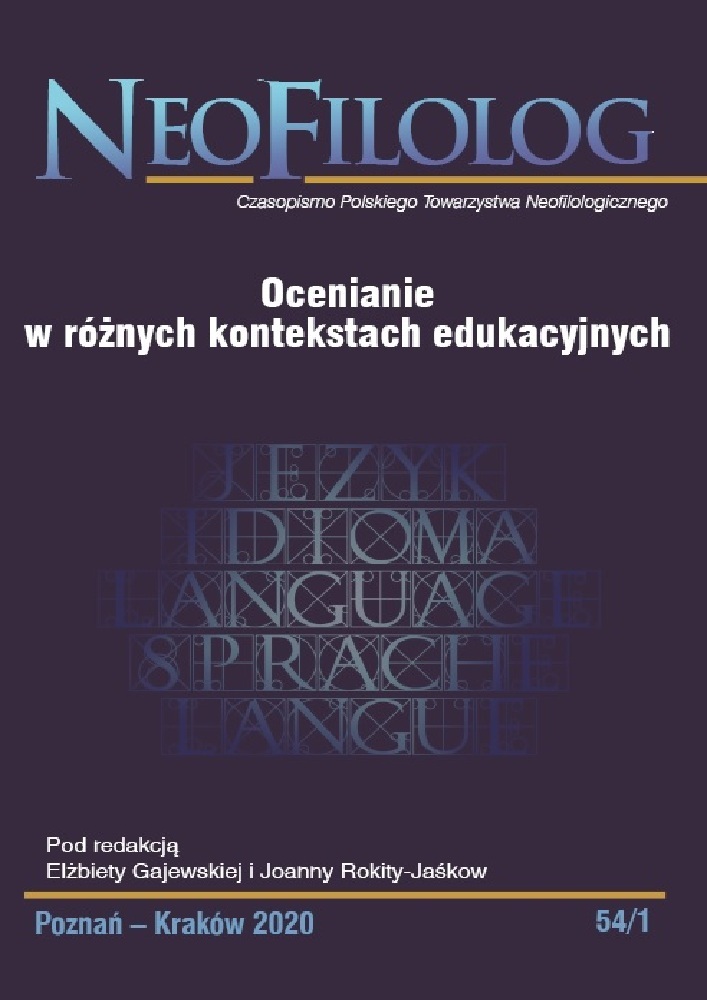Abstrakt
Although there is an increasing body of research on diverse aspects of language teachers’ professional practice there are still contexts that remain hardly explored. One such context is the oral examination situation encountered by experienced language teachers in Poland who aspire to be promoted in the ranks of the teaching profession. Drawing on positioning theory as a methodological tool to analyse the experience of one English teacher’s promotion examination situation, I will attempt to find out what aspects of teacher identity emerge from the small stories employed in the examination situation, as well as what lessons can be learnt from a study about teacher positioning (both self-positioning and being positioned) in the professional assessment context. Although the study is set in the Polish context, it may contribute to the knowledge on language teacher identity (re)construction in general through its focus on one area of language teacher professional practice – taking a teacher promotion examination.
Bibliografia
Aleksandrowska O. (2014), Osiągnięcia dydaktyczne nauczycieli języków obcych na ścieżce awansu zawodowego, (in:) Karpeta-Peć B., Kucharczyk R., Smuk M., Torenc M. (eds.), Wyznaczniki sukcesu nauczyciela i ucznia w glottodydaktyce. Warszawa: Zakład Graficzny UW, pp. 159–172.
Austin J. L. (1962), How to do things with words. Oxford: Oxford University Press.
Bamberg M. (2006), Stories: big or small: why do we care? „Narrative Inquiry”, No 16, pp. 139–147.
Bamberg M. (2010), Who am I? Narration and its contribution to self and identity. „Theory and Psychology”, Vol. 21, No 1, pp. 1–22.
Bamberg M., Georgakopoulou A. (2008), Small stories as a new perspective in narrative and identity analysis. „Text and Talk”, No 23, pp. 377–396.
Barkhuizen G. (2016), A short story approach to analysing teacher (imagined) identities over time. „TESOL Quarterly”, Vol. 50, No 3, pp. 655–683.
Barkhuizen G. (2017), Investigating multilingual identity in study abroad contexts: A short story analysis approach. „System” No71, pp. 102–112.
Baxter J. (2003), Positioning gender in discourse. Basingstoke: Palgrave Macmillan.
Beijaard D., Meijer P. C., Verloop N. (2004), Reconsidering research on teachers’ professional identity. „Teaching and Teacher Education”, Vol. 20, No 2, pp. 107–128.
Block D., Gray J., Holborow M. (2012), Neoliberalism and applied linguistics. London: Routledge.
Carter J. H., Lochte H. A. (2017), Introduction, (in:) Carter J. H., LochteH. A. (eds.), Teacher performance assessment and accountability reforms. New York: Palgrave Macmillan, pp. 1–6.
Davies B., Harre R. (1990), Positioning: the discursive production of selves. „Journal for the Theory of Social Behaviour”, No 20, pp. 43–63.
De Costa P. I. (2011), Using language ideology and positioning to broaden the SLA learner beliefs landscape: The case of an ESL learner from China. „System”, No 39, pp. 347–358.
Gee J. P. (2001), Identity as an analytic lens for research in education. “Review of Research in Education”, No 25, pp. 99–125.
Gee J.P. (2005), An introduction to discourse analysis: Theory and method. New York: Routledge.
Geertz C. (1983), Local knowledge: Further essays in interpretive anthropology. New York, NY: Harper.
Giroir S. (2014), Narratives of participation, identity, and positionality: Two cases of Saudi Learners of English in the United States. „TESOL Quarterly”, Vol. 48, No 1, pp. 34–56.
Harre R., Slocum, N. (2003), Disputes as complex social events: On the uses of positioning theory, (in:) Harre R., Moghaddam F. (eds.), The self and others: Positioning individuals and groups in personal, political, and cultural contexts. Westport, CT: Praeger, pp. 123–136.
Howard A. (2015), Giving voice to participants in second language education evaluation, (in:) Howard A., Donaghue H. (eds.), Teacher evaluation in second language education London: Bloomsbury, pp. 193–210.
Howard A., Donaghue H. (eds.) (2015), Teacher evaluation in second language education. London: Bloomsbury.
Kayi-Aydar H. (2015), Teacher agency, positioning, and English language learners: Voices of pre-service classroom teachers. „Teaching and Teacher Education”, No 45, pp. 94–103.
Kayi-Aydar H. (2019), Positioning theory in applied linguistics. Cham: Palgrave Macmillan.
Kędzierska H. (2012), Kariery zawodowe nauczycieli. Toruń: Adam Marszałek.
King M. (2015), Evaluating experienced teachers, (in:) Howard A., Donaghue H. (eds.), Teacher evaluation in second language education. London: Bloomsbury, pp. 167–180.
Linaker T. (2019), Language teacher/translator gendered identity construction: From dilemmatic to agentive – big lives through small stories, (in:) Gallardo M. (ed.), Negotiating identity in modern foreign language teaching. Cham: Palgrave Macmillan, pp. 45–68.
Menard-Warwick J. (2007), ‘Because she made beds. Every day.’: social positioning, classroom discourse, and language learning. „Applied Linguistics”, Vol. 29, No 2, pp. 267–289.
Sfard A., Prusak A. (2005), Telling identities: In search of an analytic tool for investigating learning as culturally shaped identity. „Educational Researcher”, Vol. 34, No 4, pp. 14–22.
Trent J. (2012), The discursive positioning of teachers: native-speaking English teachers and educational discourse in Hong Kong. „TESOL Quarterly”, Vol. 46, No 1, pp.104–151.
Trotman W. (2015), Reflective peer observation accounts: What do they reveal? (in:) Howard A., Donaghue H. (eds.), Teacher evaluation in second language education. London: Bloomsbury, pp. 181–192.
Werbińska D. (2014), First-Year English Teachers’ Discursive Positioning: Languaging as Externalization, (in:) Lankiewicz H., Wąsikiewicz-Firlej E. (eds.), Languaging Experiences. Learning and Teaching Revisited. Cambridge: Cambridge Scholars Publishers, pp. 191–221.
Werbińska D. (2017), A teacher-in-context: Negotiating professional identity in a job promotion examination. „Apples – Journal of Applied Language Studies”, Vol. 11, No 2, pp. 103–123.
Licencja
Prawa autorskie (c) 2020 Dorota Werbińska

Utwór dostępny jest na licencji Creative Commons Uznanie autorstwa – Bez utworów zależnych 4.0 Międzynarodowe.
Przedstawiany utwór (artykuł) upubliczniany jest na podstawie umowy z autorem i na licencji Creative Commons Attribution-NoDerivatives 4.0 International (CC BY-ND 4.0).
Użytkownicy mają obowiązek podania wraz z rozpowszechnionym utworem, informacji o autorstwie, tytule, źródle (odnośniki do oryginalnego utworu, DOI) oraz samej licencji;
- bez tworzenia utworów zależnych,
- utwór musi być zachowany w oryginalnej postaci.
Uniwersytet im. Adama Mickiewicza w Poznaniu zachowuje prawo do czasopisma jako całości (układ, forma graficzna, tytuł, projekt okładki, logo itp.).

